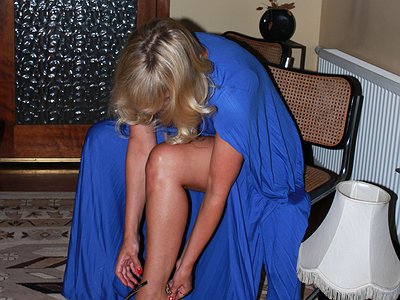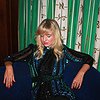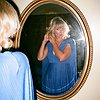Could you take us through a day in your life, from a possible morning routine through to your work? Do you have a fixed schedule? How do music and other aspects of your life feed back into each other - do you separate them or instead try to make them blend seamlessly?
I will describe my ideal day, if I’m able to achieve a large percentage of my daily goals, I feel content and while I don’t have a fixed schedule per se, if I deviate too much from what I like to fit in a day then I’ll feel lazy and if exacerbated, a sense of despair, haha.
I generally wake reasonably early, I’ll either start with a morning meditation or I’ll make a pot of tea in a deep green enamel pot, something about the chipped surface and the clang of the metal lid is deeply comforting when waking. I then sit at the desk by the window that overlooks tall trees, Glasgow University and further on, the hills in the distance, and I write a bit whether in my diary or work on lyrics. Sometimes I might listen to some snippets of songs I’m working on. While I generally try to write or even just sit and drink my tea before looking at my phone, I do sometimes start the day with reading something instead though early morning writing has been a prolific time for writing for many years now. I know that I have to deal with the usual email business before moving onto other work for the day, it nags away at me if I haven’t dealt with something whether tour plans, interviews, personal correspondence, all the usual admin that can get in the way of the real work. And there are some days when the admin takes over and there’s not time for the real work. Those days are unsatisfying.
Exercise is key whether yoga, a weight workout or a session with my trainer. This in addition to a daily walk, either through the city, parks or along the canal. And then there’s the garden, a 20 minute bike ride from my flat, a beautiful space hidden in the heart of the city and full of flowers, produce, huts, birds, ponds, fresh air. I think the only time my mind is truly blank is when I’m gardening, particularly weeding or cutting branches/overgrowth. Your sense of time changes completely and the physical and mental satisfaction of garden work is like no other. Sometimes during these outdoor adventures I take photographs, taking photographs is always a part of my day at some point whether inside or out. I like to do vocal exercises and I’ll spend some hours of the day playing pedal steel, I have a setup that works for me with a tiny Blackstar amp I can plug headphones into and I try to semi-regularly play at a local grubby rehearsal space so I can play as loud as I want.
Part of my day is devoted to some sort of beauty care (skin, hair, nails) I rarely go a day without putting on makeup, I just like it. And a bath (or two) is a must. Once in a discussion with Sterling Smith (Jandek) I professed my love for the twice a day bath and he responded “of course, Six and Six”. Nice to know the habit even inspired an album title of his. And in addition to walks, a bath can be a place that inspires so many melodies, lying in the tub in the cavernous echo.
In the evening, hours are devoted to dinner, I like to take it slow, converse, listen to music, dining is a sensual experience in its own right. I’m always listening to music in the background, whether vinyl or an NTS show or maybe a podcast. During the darker Autumn and Winter months is the time I tend to watch films or old British Telefantasy like Doctor Who & Blake’s 7. And yes, all of these little daily routines feel inextricably part of the music, there’s not much separation between all of my pleasures …
Could you describe your creative process on the basis of a piece or album that's particularly dear to you, please? Where did the ideas come from, how were they transformed in your mind, what did you start with and how do you refine these beginnings into the finished work of art?
My last album, I Abused Animal was a benchmark for me because for the first time, I went into a proper studio to record it and relinquished the control I was used to when recording my albums myself. Really, that album took me years for all sorts of reasons. Outside of the solo acapella track that titled and opened the album which was completely improvised in the studio, the other songs I played for a few years before recording them. It was a process of refining the songs in a live context and getting used to the songwriting process in general, gaining a bit of confidence. And I tried again and again to record the songs myself, it simply wasn’t working, ultimately because it was no doubt urging me to take the step into the studio, so that was a good lesson in stepping back and rather than getting frustrated and giving up, instead coming up with a solution to capture these pieces and the studio was the solution. I went in with big ideas, I was going to have overdubs, play all sorts of instruments, this was really going to be a STUDIO PRODUCTION, but when I got there, a beautiful, remote mansion in England, assisted by my spiritual advisor for the album, Dean Roberts, I quickly realised all those grand plans were unnecessary. The songs felt whole more stripped back to just the pedal steel and voice. I felt raw, exposed even confused during that recording process, diving into an unfamiliar situation where I found myself questioning everything about my work. That experience gave me the confidence to then go into the studio to record my newly released album, Throne, and commit to overdubs and new approaches to my song work that I haven’t tried before, to take those risks in a studio setting that I’m more used to in a live setting.
There are many descriptions of the ideal state of mind for being creative. What is it like for you? What supports this ideal state of mind and what are distractions? Are there strategies to enter into this state more easily?
In a way I think it’s important to remember that there’s really no perfectly ideal state for creativity and if you spend your time trying to reach this perfect state, you’re just not going to get any work done. The most important thing is work, pure and simple, so maybe the ideal is that you should be able to work in any situation no matter what.
How is playing live and writing music in the studio connected? What do you achieve and draw from each experience personally? How do you see the relationship between improvisation and composition in this regard?
For me, they’re completely different processes which is why you have to get over the hurdle of things feeling forced or somehow “unreal” in the studio. Playing live is a different type of risk taking, a feeling of being more “in the moment”, I feed off of the energy of the audience and the space, I love that tension and where it takes me, often breakthroughs in my playing happen more in a live context in the studio, then I take that experience into the studio. In the studio it can be more difficult to get out of my head in the way I can do when I play live but the challenge of making something meaningful in the studio while you are battling with your brain is still an interesting one. I also love how the albums made in the studio take on a new life when you play them live. For the first time in my solo playing, I’ll be touring with accompaniment, performing Throne live with John Hannon bolstering my sound and I’m already excited about this new challenge and where it will push Throne and new material I’m working on.
How do you see the relationship between the 'sound' aspects of music and the 'composition' aspects? How do you work with sound and timbre to meet certain production ideas and in which way can certain sounds already take on compositional qualities?
Sound and composition are one and the same for me.
Our sense of hearing shares intriguing connections to other senses. From your experience, what are some of the most inspiring overlaps between different senses - and what do they tell us about the way our senses work? What happens to sound at its outermost borders?
Sound and making music are a full body sensory experience for me, I’d take it further and say a full on sexual experience for me, the sensory and sexual are inextricably linked. Personally, I often close my eyes while playing and can see the composition visually, it almost plays out cinematically behind my eyes but really every sense is involved when I play. And the physical relationship with my instrument is very important, I NEED that physical tie, to feel the cool stainless steel of my tone bar in the left hand while feeling the tightness of my guitar picks on my right fingers or the sometimes painful impact of my skin clawing at the strings. The pedal steel REQUIRES full body involvement, the pedals under by feet, my legs inserted between the knee levers, I can feel the vibrations of sound through the instrument and back again, the connection is an intimate one, a feedback loop.
Art can be a purpose in its own right, but it can also directly feed back into everyday life, take on a social and political role and lead to more engagement. Can you describe your approach to art and being an artist?
Do it everyday, do it yourself and try to live every aspect of your life as an artist, listen, pay attention, treat others with respect and recognise they’re on their own life journey just as you are, so I try not to judge people, I do my best to remain open, honest and compassionate, especially in today’s world. And I’m attracted to people who are passionate about their work, whatever that work is! Even if THEY don’t refer to is as art or to themselves as artists, are they following their own passions with love and zest? Often the content isn’t even of importance to me from this perspective, if I see someone in love with their work, in love with their process, they have my respect.




